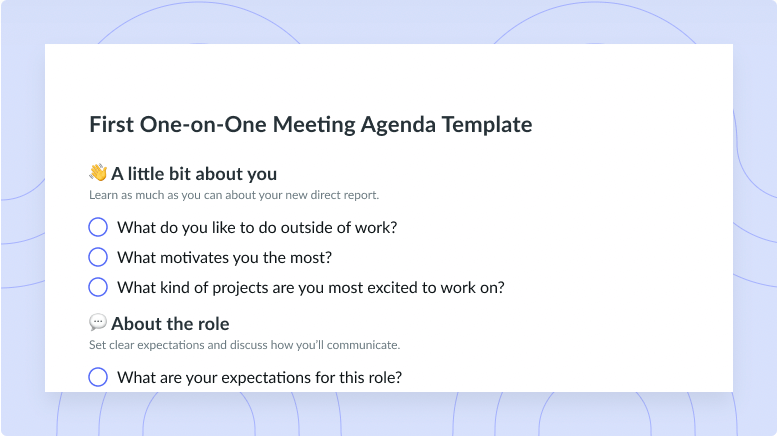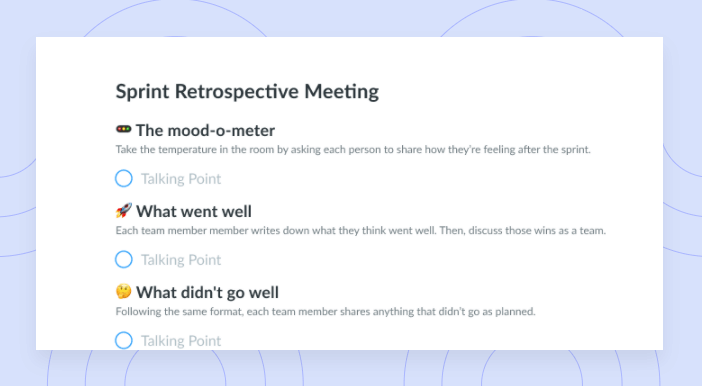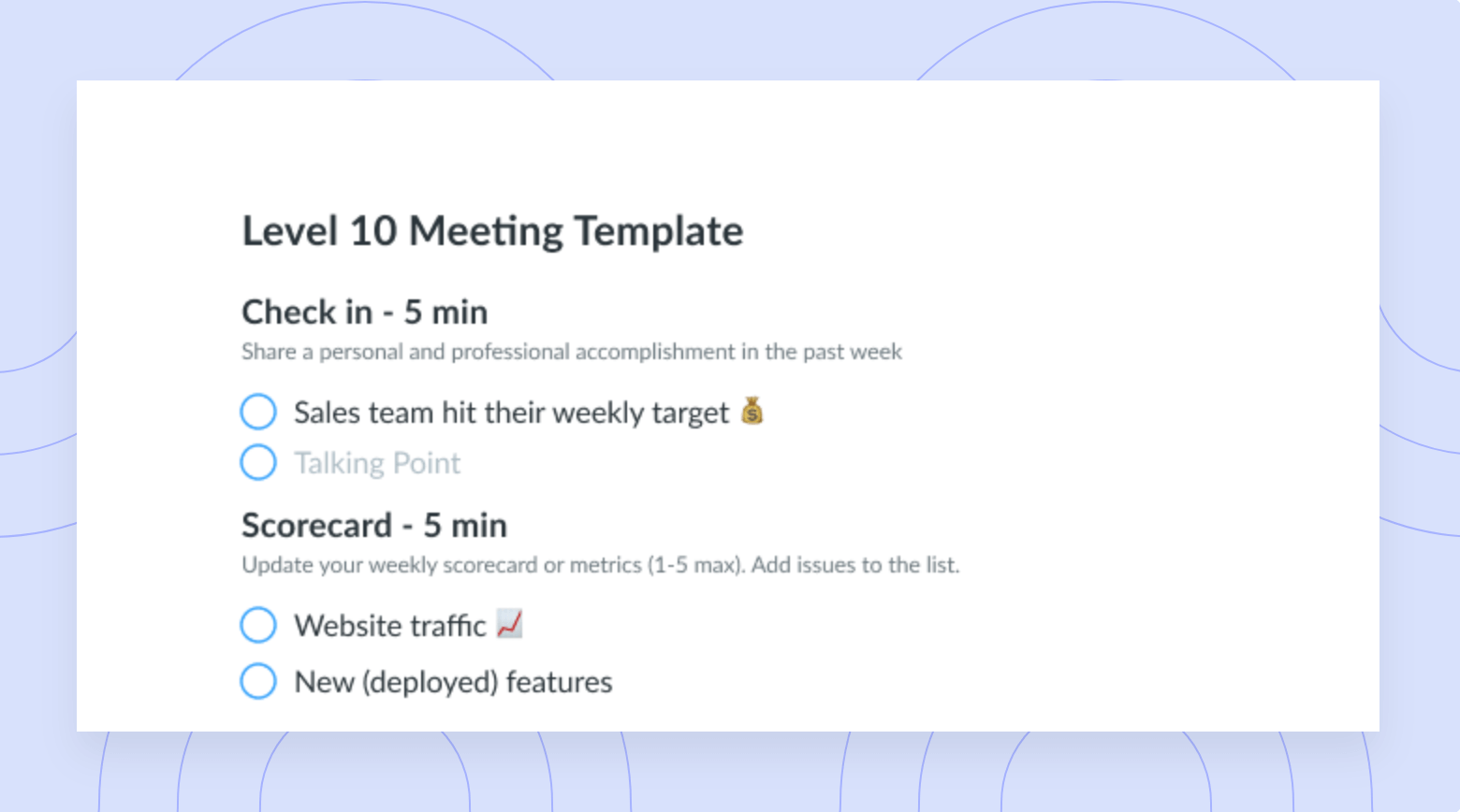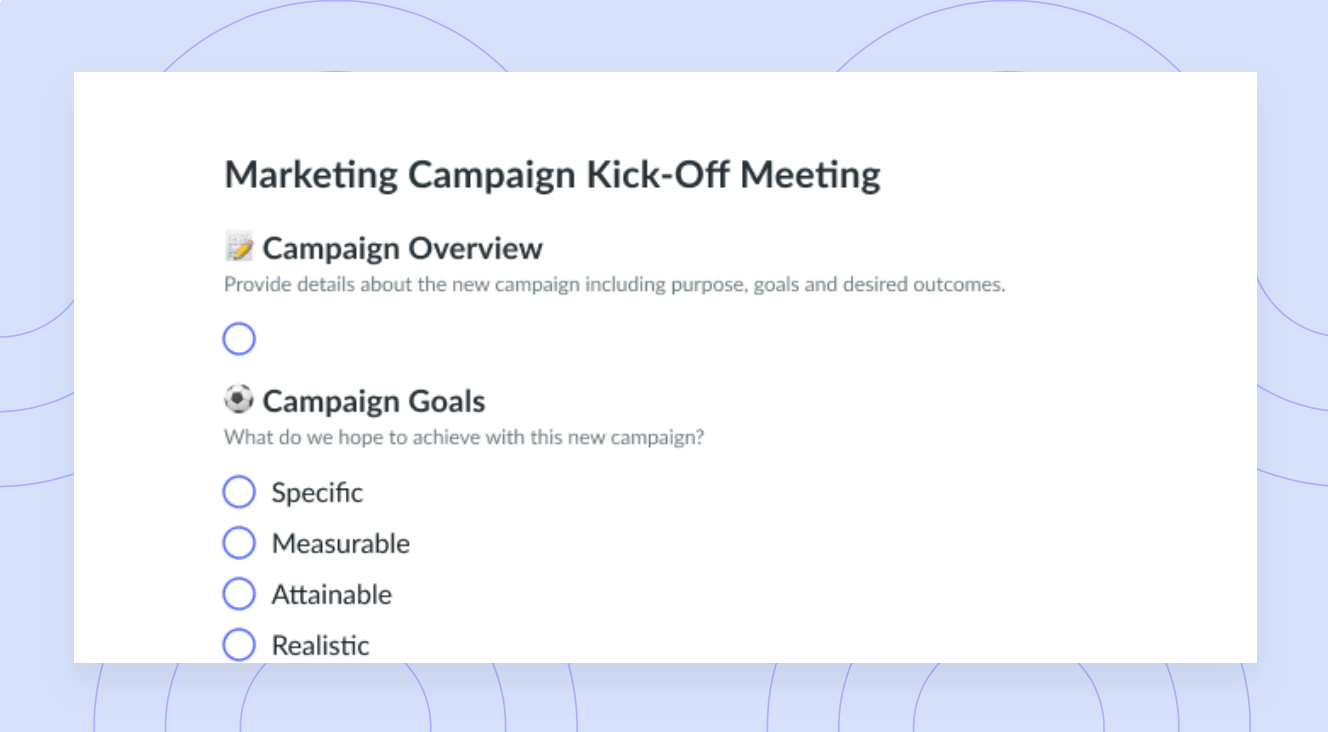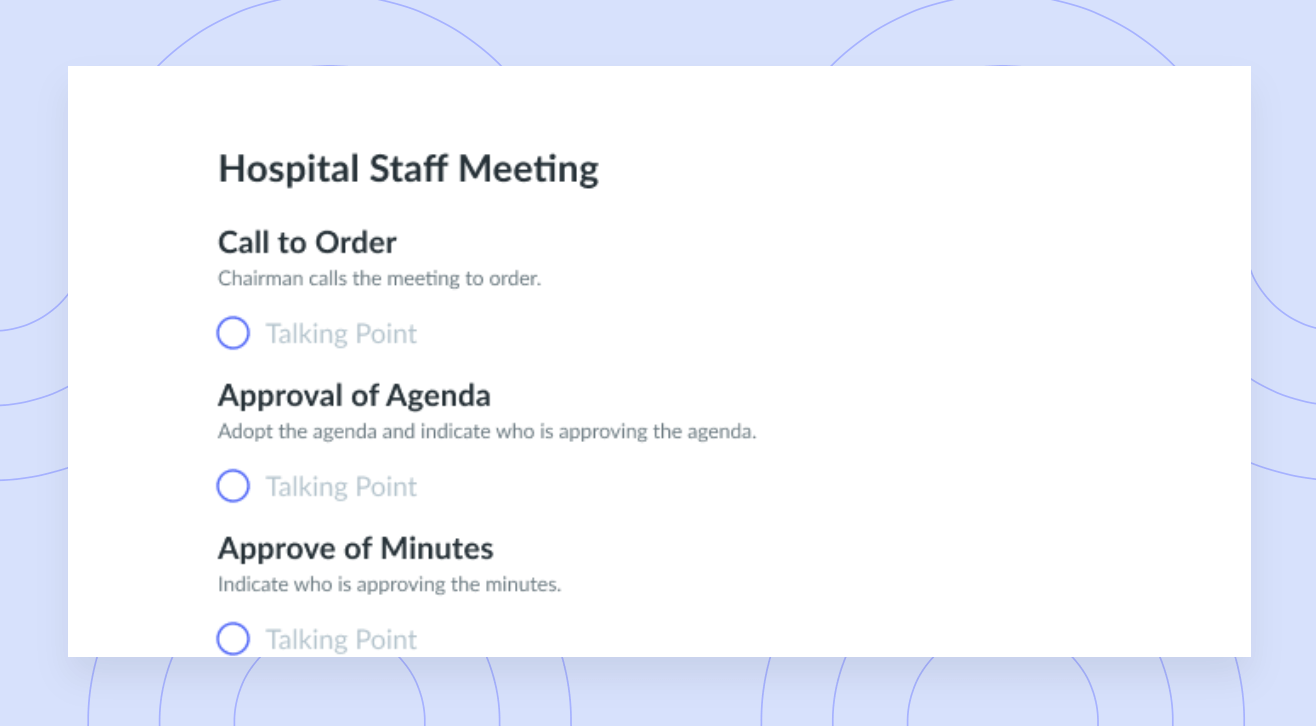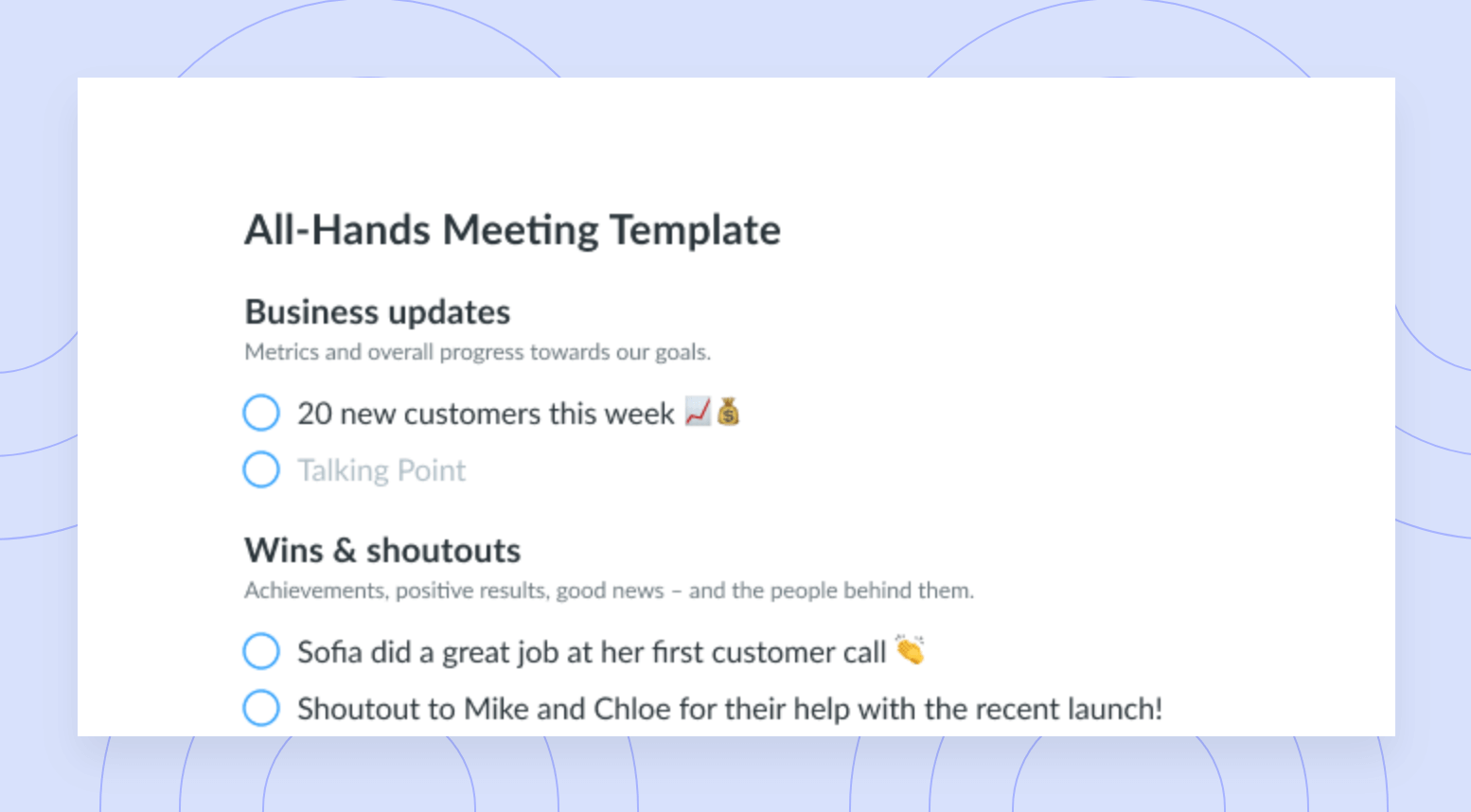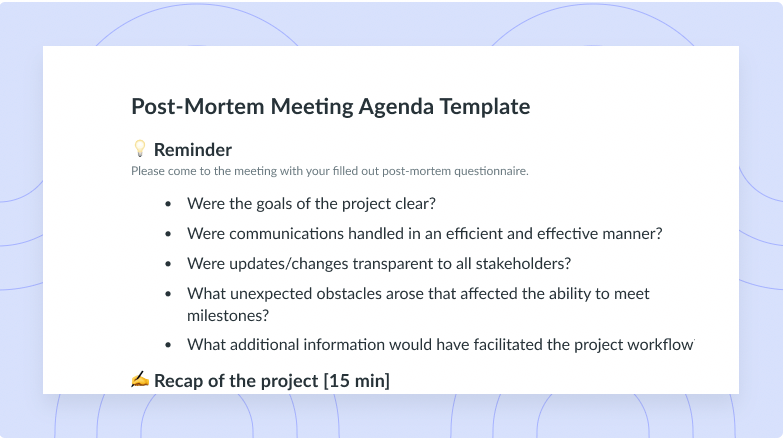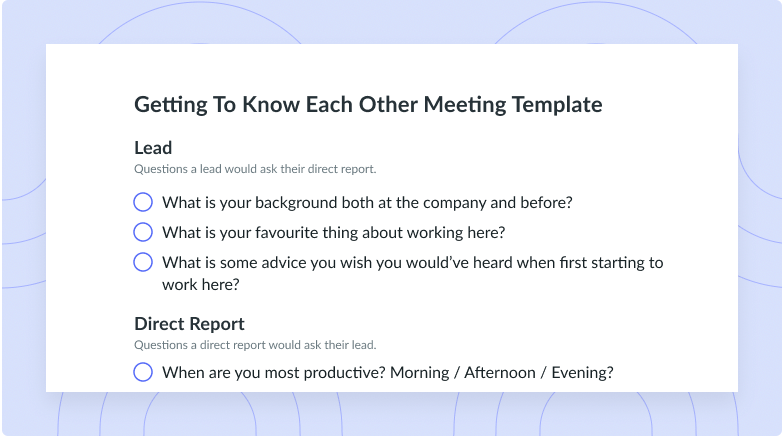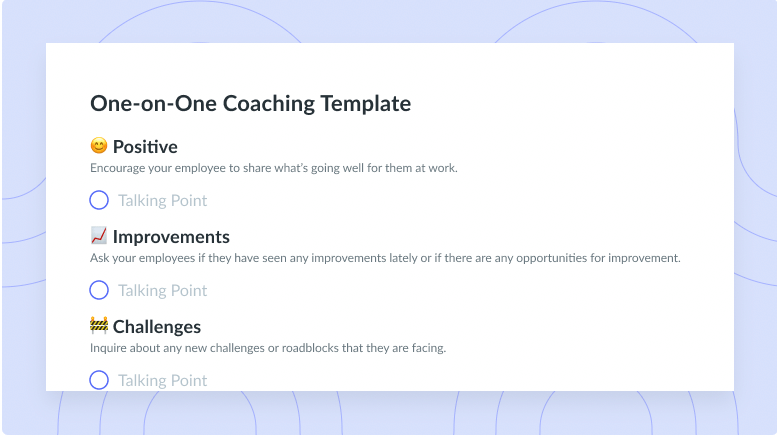12 Meeting Personalities: Which One Are You?
Uncover your meeting personality so you can embrace and manage your strengths in particular meetings and elevate your productivity.
Building self-awareness at work is essential for identifying the most appropriate way to engage in decision-making and have effective conversations. Different meeting personalities each have a set of strengths and weaknesses that can affect your meetings and the productivity of your team. Taking the time to recognize which kinds of meeting personalities you associate with can help you use your strengths to your advantage. This self-awareness can also help you choose when it may be best to communicate or to simply listen along.
This article will cover why it’s important to understand different meeting personalities, go through 12 meeting personality types, and give you five ways to manage different meeting personalities.
- Why is it important to understand different meeting personalities?
- 12 meeting personalities
- 4 ways to manage different meeting personalities
Why is it important to understand different meeting personalities?
It’s important to understand different meeting personalities because these personalities can affect meeting productivity whether you’re meeting online or hosting a discussion in person. Because personality traits can have a huge effect on the way people collaborate, it’s important and effective to understand all the meeting personalities on your team (especially your own) so you can leverage them to accomplish organizational goals. Identifying the strengths and weaknesses of your team will support you all in playing to your strengths.

Run delightful meetings
Increase meeting engagement and productivity with a collaborative agenda that the whole team can contribute to. Try using a tool like Fellow!
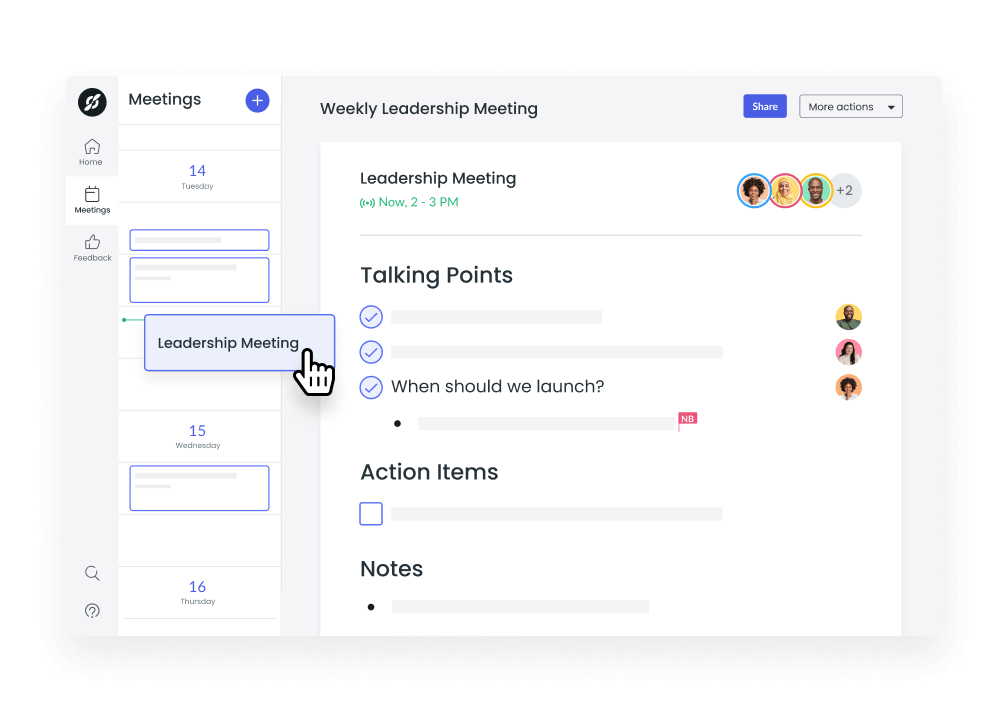
12 meeting personalities
- The introvert
- The extrovert
- The multitasker
- The distracted
- The interrupter
- The late participant
- The underprepared
- The leader
- The fidgeter
- The team player
- The skeptic
- The wallflower
1The introvert
Introverts tend to keep things to themselves—including any ideas, opinions, or suggestions they may have as meetings unfold. They may jot down some notes but rarely share these meeting notes with the rest of the group. Introverts don’t tend to enjoy speaking in group settings, so they’ll be more likely to listen to the discussion.
2The extrovert
Extroverts tend to be at the center of the conversation in a meeting. They enjoy speaking in front of others and feel more than comfortable sharing their thoughts and opinions on any matter without thinking twice. Extroverts need opportunities to express themselves authentically and communicate freely.
3The multitasker
Multitaskers have a tough time giving their full attention in a meeting and tend to be scrolling through their phones, browsing on their computers or phones, and taking other notes while the meeting is taking place. In meetings, facilitators often need to repeat themselves and the meeting tends to lose its flow a little bit. As the presenter, be sure you call on multitaskers often to ensure they’re not missing essential parts of the meeting.
4The distracted
The distracted personality in a meeting tends to have their attention pulled elsewhere quite easily. If your meeting room has windows, it could be that this person becomes preoccupied with whatever is going on outside the meeting room, that the participant daydreams, or, in the case of an online meeting, the individual is distracted by whatever is going on in their home office.
5The interrupter
Interrupters tend to frequently change topics during meetings and take people off topic from the meeting agenda. This habit often derails the meeting and takes it away from its true purpose. It’s important to set clear meeting expectations before the discussion so participants can be reminded of good meeting etiquette and to keep their questions for the end of the meeting.
6The late participant
The late participant is the person who never fails to join the meeting late. Whether it’s a few minutes or halfway through the meeting, this late entry becomes a distraction to everyone else. What’s more is that the late participant misses some of the meeting and needs to get caught up to speed. It’s important for the late participants to ask for meeting notes if they’ve missed a substantial portion of the meeting.
7The underprepared
Underprepared participants are a little disorganized. They have rarely read through the meeting agenda and often aren’t ready to provide updates, answer questions, or participate in a meaningful way in the discussions taking place. If you tend to be the underprepared participant, it’s best to actively listen to the discussion to ensure you grasp as much of the meeting as possible.
8The leader
The leader is the individual who tends to set the tone, pace, and agenda of the meeting, including the expectations for each participant before the discussion. This person usually leads the conversation but also balances this well by being a great listener who actively works to resolve any issues that arise.
9The fidgeter
People who are fidgeters tend to have a lot of difficulty staying still during a meeting. This isn’t necessarily an issue for the fidgeter, but it can be troublesome for those who are distracted easily because this fidgeting can take the attention away from the conversation. If you’re always gently tapping your finger, bouncing your knee, or playing with a pen, you’re a fidgeter.
10The team player
Team players find a nice balance between actively participating and listening. They contribute to the conversations to help resolve issues, brainstorm, and take on responsibilities. The hope is that most of your team members have team player qualities because this personality type helps support the flow of your meeting and helps you and your team work more productively.
11The skeptic
Skeptics tend to have something to say about any and every approach or suggestion that is made. Skeptics don’t always necessarily have a negative point of view, but they enjoy dissecting suggestions or decisions and might enjoy looking for more innovative approaches that the team hasn’t tried yet. The skeptic can actually bring about some really effective innovative solutions.
12The wallflower
The wallflower is similar to the introvert in that they enjoy listening more than speaking because the latter makes them uncomfortable. They tend to have really good ideas but rarely voice them, especially in group settings. The wallflower will participate only when they are called on or if they have something really important to share that may affect their other team members.
4 ways to manage different meeting personalities
- Create a collaborative meeting agenda
- Set meeting expectations
- Ask for meeting feedback
- Assign meeting roles
1Create a collaborative meeting agenda
First, create a collaborative meeting agenda. This is an inclusive practice that allows everyone to add their talking points so no matter what someone’s meeting personality is, you can ensure they have a chance to share their ideas and thoughts. This is especially effective for individuals who don’t feel as comfortable speaking in front of a group of people (like the introvert and the wallflower). This way, their thoughts and opinions are still considered. Having this collaborative meeting agenda also helps you ensure that everyone is involved in deciding what the most important meeting topics are.
2Set meeting expectations
Set meeting expectations before engaging with your team so everyone can attend the meeting feeling comfortable, feeling prepared, and knowing what is expected of them. When you set meeting expectations, this helps the individuals whose meeting personalities make them tend to be late, distracted, or underprepared. This allows your team members to feel more at ease and experience less stress and anxiety about their upcoming responsibilities.
3Ask for meeting feedback
Another great way to manage different meeting personalities is to ask for meeting feedback. A healthy and strong culture starts with feedback. Fellow helps support your team in sharing real-time feedback on meetings so you can have honest conversations about what is effective, what is not, and how you can better serve your team members. Asking for feedback about your meetings is a great way to normalize feedback and build psychological safety across your team.
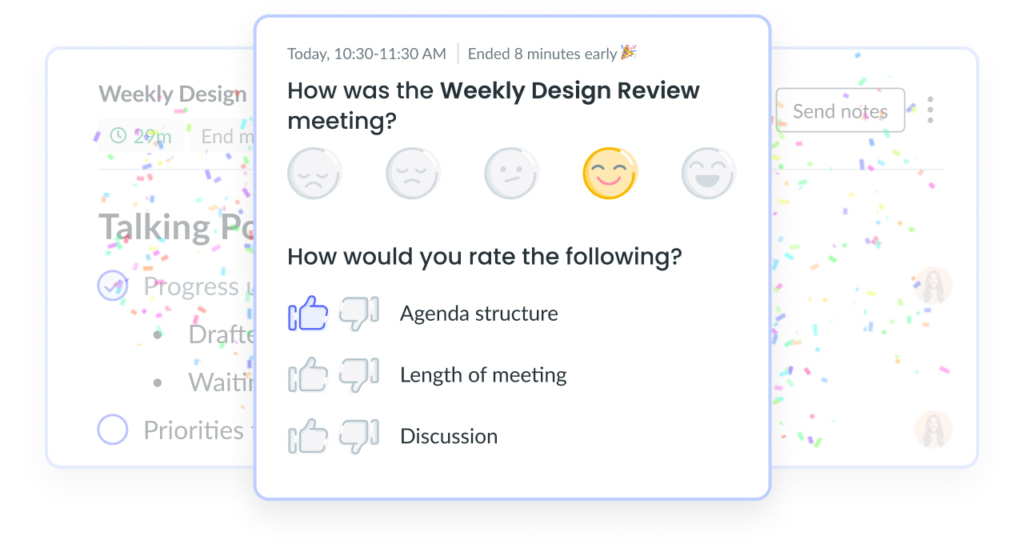
4Assign meeting roles
Assigning meeting roles can help to manage several meeting personalities and ensure the meeting runs as productively as possible. Nothing is worse than attending an unorganized meeting. When nobody knows what they’re responsible for, meetings begin and end late, everyone talks over each other, and nothing gets recorded. Meetings should be inclusive, collaborative, and a good use of everyone’s time. Therefore, it’s important to define clear meeting roles to ensure that your meetings are effective and organized, and create conversations where everyone’s voice is heard.
Parting advice
Knowing and understanding meeting personalities can help your team stay productive and motivated as you learn to work more effectively together. Building self-awareness is essential to see how you can best leverage your strengths and balance out areas of weaknesses with other people’s strengths. This allows the whole team to elevate its productivity and generally have more effective meetings!









